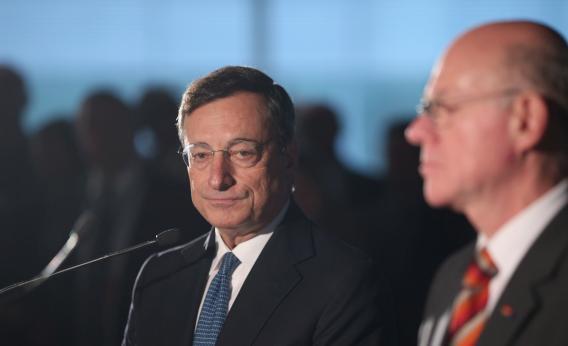Key to understanding the current European situation is that the European Central Bank has decided, for various reasons, that it should act as the paternalistic uncle of the eurozone’s member states. The ECB employs a lot of smart economists, it’s free from political influence and corruption, and it knows what’s best. But the ECB can’t directly rewrite national pension policies, labor market policies, or anti-competitive regulatory policies. So what it’s doing instead is essentially threatening to use monetary policy as a weapon to punish countries that don’t deliver the goods in terms of policy reforms, and reward countries for undertaking them.
There are a lot of problems with this approach, including the fact that over its 15 year lifespan its only success story is the Harz Reforms in Germany.
So let me propose a different idea. Instead of disciplining countries by threatening to crush their financial systems or send them into recession, threaten to punish wayward countries with inflation. The ECB should commit itself to generating a high level of nominal growth continent-wide, fully aware that such a policy runs a substantial risk of generating an uncomfortably high level of inflation. But in the European context a higher nominal growth rate doesn’t necessarily entail inflation. After all, even the richer EU members such as France and Germany are considerably poorer than the United States and have a substantially lower share of their population involved in the paid workforce. Your Portugals and Italies are even further behind. Countries that successful adopt economic reforms that promote competition and labor supply expansion will manage to ride the nominal tiger and generate huge amounts of real growth. Countries that fail to adopt smart reforms will be wracked with inflation. Since voters don’t like inflation and do like real growth, elected officials will be incentivized to adopt smart reforms even if the reforms are superficially unpopular—the only really important thing is that they work.
This has, I think, three major advantages over the current ECB strategy.
1: It’s more credible, since it’s rule-based and continent-wide. Right now one problem the ECB faces is that it’s difficult to use the monetary policy Death Star on the Italian economy without also destroying the Irish economy. When inflation is used as the tool of discipline, by contrast, it’s easy for different countries to have different fates.
2: It addresses issues at sub-national levels. Lots of public policy is implemented by regional or municipal governments, and the interplay between different layers in a federal structure is hard for outsiders to judge. The inflation weapon, by contrast, is purely outcome based. Useful supply side reforms are rewarded regardless of whether they’re undertaken by a prime minister or a governor or a mayor.
3: Related to the above, the inflation strategy does not require the ECB to accurately prejudge which reforms are best. To the extent that countries’ pro-efficiency reforms really do increase efficiency, they’ll suffer less inflation automatically. The death star approach, by contrast, asks the ECB to essentially guess which reforms are really important and what pieces of legislation really embody the correct idea. It’s a covert form of central planning and suffers from all the usual knowledge problems.
The underlying issue here, of course, is that at some point before I was born there was a serious inflation problem in the west. In response to that, a number of academics constructed models according to which democratic politics has a consistent pro-inflation bias. There is zero empirical evidence that this is true and ample evidence that the reverse is true, but central banks all around the world cling to this myth because it rationalizes their privileged position in the political order. But the same myth that justifies central bankers’ relative lack of accountability also restrains them from unleashing the true power of the printing press. Given the state of the European economy, the inflation weapon would be much more powerful and effective than the ECB’s current tactics but they regard deploying it as unthinkable while unending grinding recession is okay.
